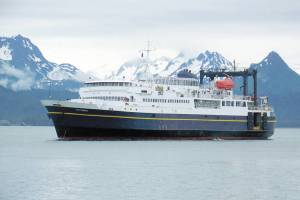Judge allows part of Kenai subsistence suit to proceed
Published 4:48 am Tuesday, June 14, 2016
The Ninilchik Traditional Council’s battle for a Kenai River subsistence gillnet will run into the 2016 salmon season, with a lawsuit over last year’s operational plan potentially brushing up against this year’s plan.
The road to a Kenai River gillnet has been rocky for the Ninilchik Traditional Council. The federal fishing manager wouldn’t approve it in 2015 because of conservation concerns. State and federal biologists advised against it. Alaskans broke volume records begging the board to reconsider it. Other subsistence groups chimed in April to ask the Federal Subsistence Board to repeal it entirely.
The Ninilchik Traditional Council filed a complaint against Federal Subsistence Board Chair Tim Towarak, U.S. Secretary of Agriculture Tom Vilsack and U.S. Secretary of the Interior Sally Jewell in October 2015, saying both the Federal Subsistence Board and federal wildlife manager erred in not approving the 2015 gillnet operational plan for the Kenai River.
In March, the federal defendents asked the judge to dismiss the case. He did so partially after an April 14 hearing, leaving certain elements of the complaint to be further considered.
NTC intends to file an amended complaint against federal management now that the suit’s scope has been narrowed.
The remaining complaints will examine whether or not federal in-season manager Jeff Anderson acted legally when he did not approve the Kenai River gillnet operational plan in 2015.
The defendants asked Judge John Sedwick to dismiss the case, saying the NTC has no legal standing to sue and that its claims are “unripe.”
Among other arguments, the defendants said the decisions regarding the Kenai River gillnet are not final. More than 700 Alaskans submitted requests for reconsideration to the board; until these are resolved, the feds say the matter is not final and therefore unripe for a legal challenge.
Sedwick disagreed, saying the law “does not state that a board action is not final until all third-party requests for reconsideration are resolved. It states that if a party requests reconsideration and the board denies that request, the board’s denial ‘represents the final administrative action’ on that specific request.”
Because the matter is ripe, Sedwick said portions of NTC’s complaint fall under the court’s jurisdiction and give NTC standing to sue.
Some portions of what NTC requests do not fall under the court’s authority. Sedwick said the court has authority to examine whether Anderson’s decision to not approve the gillnet was appropriate under the Administrative Procedures Act, but not to force Anderson or the board to approve the gillnet.
“The court lacks jurisdiction over NTC’s request for an order compelling defendants to issue the Kenai gillnet permit because nothing in the (regulation) requires the in-season manager to issue that permit,” reads the ruling. “Instead, the regulation gives the in-season manager discretion to determine whether an operational plan is meritorious.”
Many of NTC’s claims concern the subsistence section of the Alaska National Interest Lands Conservation Act, Section 804. The act, or ANILCA, established conservation mandates for 100 million acres of Alaska land, including outlines for federal subsistence management.
Sedwick notes nothing in ANILCA Section 804 can force the board to rescind Anderson’s order, as NTC originally requested last October.
“NTC’s complaint alleges that Anderson has made several decisions that violate Section 804, in particular his decision to ‘close the fishing season for chinook salmon on the Kenai River before it began, and keep it closed throughout the season’ and his decision not to issue a Kenai gillnet permit.”
NTC has requested an administrative record from the defendants in order to file an amended complaint about Anderson’s decision.
The Federal Subsistence Board approved the Kenai gillnet in January 2015 to a statewide wave of vocal criticism.
State and federal biologists opposed both the Kenai net and the Kasilof River net. Gillnets are a non-selective gear type, and could possibly snag precious king salmon when sockeye are the target species, they said.
The board voted 5-3 in favor. The U.S. Fish and Wildlife Service representative on the board — which controls the Kenai National Wildlife Refuge in question — voted against it.
Both nets must have an operational plan, however, approved by area manager Anderson.
Anderson approved the Kasilof plan, but did not approve the Kenai plan. Instead, Anderson closed the river to king fishing entirely last summer, even as escapements were enough that the Alaska Department of Fish and Game liberalized king salmon fishing rules to allow retention, as well as additional commercial fishing time, in the final week of July.
NTC asked the board to overturn Anderson’s closure and rewrite regulations to take them out of federal fishing management scope, or to force the federal manager to approve their operational plan.
The board shot down NTC’s requests; each failed by a tie vote. In response, NTC filed the lawsuit in October.
In April, the Cooper Landing and Hope Federal Subsistence Community filed for a change in the 2017-2019 Federal Subsistence Board proposal book that would eliminate the Kenai gillnet. The gillnet, the Cooper Landing and Hope filers said, has a negative direct impact on them.
DJ Summers can be reached at daniel.summers@alaskajournal.com.




